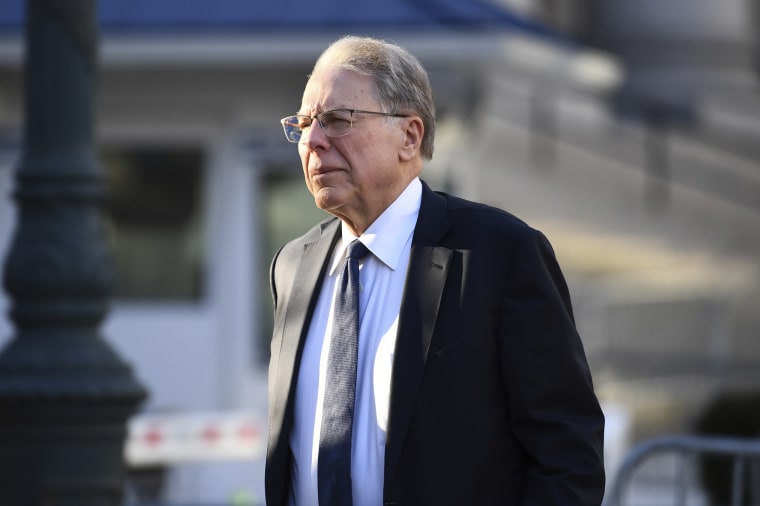Wayne LaPierre, the National Rifle Association’s longtime leader, confirmed under oath in a New York City courtroom Friday that he used the organization’s financial resources on chartered private jets, family trips, black car services and high-end gifts for friends.
LaPierre, 74, other NRA leaders and the organization itself are fending off a lawsuit brought by New York Attorney General Letitia James in 2020 that alleges they violated nonprofit laws and redirected millions of dollars of NRA funds for personal use.
He took the stand Friday morning for the first time, answering most questions with a simple “yes” or “no.” Citing health issues, he has previously said that he intends to resign at the end of the month from the gun rights group, which he has led for more than 30 years as its executive vice president.
LaPierre testified that he had no knowledge of the large sums the NRA was spending on chartered private planes and black car services, though he did not dispute the dollar figures when presented with invoices and receipts.
He confirmed under oath that NRA funds were used to bankroll a flight from the Bahamas to Washington, D.C., in 2017 that cost more than $22,000, for example. He conceded that NRA rules mandate that employees fly coach.
He testified that, on occasion, family members would fly on private planes when he was not present. He authorized a $11,000 flight taken by his niece Colleen Sterner, an NRA employee, and her daughter, for instance.
He testified that he and his family often traveled on a luxury yacht, known as Illusions, owned by David McKenzie, the head of a television production company that had a contract with the NRA. McKenzie and his wife hosted the LaPierres for vacations in the Bahamas and joined them for trips to India and Abu Dhabi.
LaPierre acknowledged that the NRA board did not approve these trips, and he confirmed that various financial disclosure forms he filled out in 2017 and 2018 did not detail his financial entanglements with a “non-NRA entity.”
McKenzie’s company, Associated Television International, produced a program called “Crime Strike,” which LaPierre once hosted. LaPierre was asked whether he knew that the NRA paid Associated Television “millions” for its services. He replied that he did not know the exact figure.
Assistant Attorney General Jonathan Conley showed jurors copies of reimbursement requests for gifts that LaPierre purchased for friends and associates over the years, including $830 candlesticks from Bergdorf Goodman for the McKenzies’ daughter.
Conley showed that LePierre had also submitted reimbursement forms for gifts from Neiman Marcus, Christmas tips for landscapers at his house, membership dues for a golf club in Washington and hotel rooms for Sterner, including a 2017 stay at the Beverly Hills Hotel that cost more than $6,000.
In the morning session Friday, LaPierre — brow furrowed and tone even — rarely elaborated on his answers beyond “yes” or “no.” He appeared most animated when answering questions about why he decided to open bankruptcy proceedings for the NRA, insisting that he did not do so to avoid regulatory scrutiny from New York state.
“I filed for bankruptcy to protect the NRA from dissolution and seizure of its assets by the attorney general, and to put NRA in a sound position for the future in a state where we would have a fair regulatory playing field, which was Texas,” he said.
The other defendants, including the NRA itself, are accused of violating nonprofit laws and internal policies as they enriched themselves, the suit says, contributing to the gun rights group's loss of more than $64 million in three years.
They are Wilson “Woody” Phillips, a former NRA treasurer and chief financial officer, and John Frazer, the corporate secretary and general counsel.
If the jurors find LaPierre, Phillips or Frazer liable, they will recommend the amount of money that each would have to repay the NRA.
State Supreme Court Judge Joel Cohen, who has the final say over monetary damages and remedies, could determine whether the defendants should be permanently barred from serving on the board of any charity in New York and whether an independent monitor should oversee the NRA’s finances.


